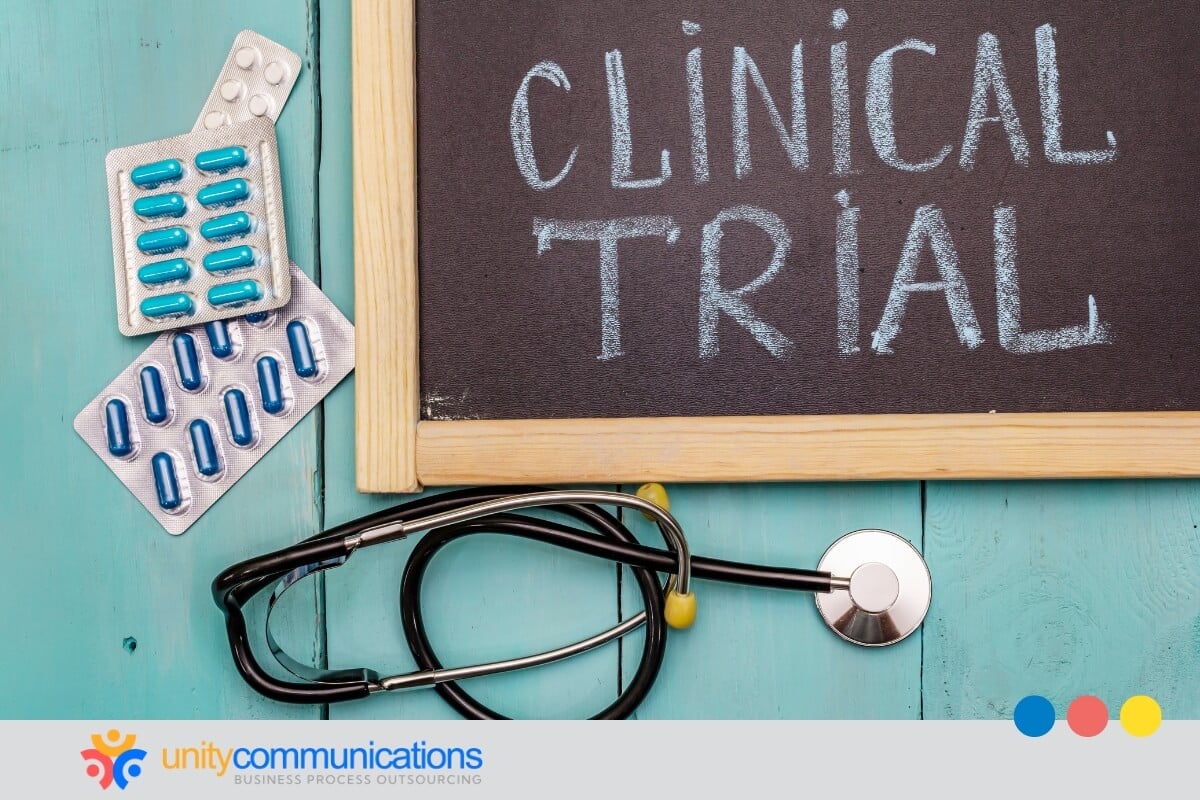IN THIS ARTICLE
Table of Contents
The biotechnology and pharmaceutical sector establishes the foundation for modern healthcare and enhanced quality of life. It requires constant innovation to treat diseases, improve wellness, and secure global health.
However, enterprises in this sector still struggle to meet the increasing demand for urgent care, especially during pandemics and emergencies. They need to accelerate cost-effective research and development (R&D).
Business process outsourcing (BPO) boosts innovations in biotech and pharma in five ways. Keep reading this article to learn more.
How outsourcing enhances R&D in biotech and pharma

As pharma and biotech companies encounter mounting pressure to innovate while optimizing costs, BPO providers continuously expand their services to support R&D programs. These third-party firms offer access to a large talent pool and advanced technology at monthly, hourly, or project-based pricing.
Besides accelerating R&D, service outsourcing allows in-house teams to prioritize high-value medical breakthroughs and avoid project delays. The discussion below covers what BPO firms primarily provide to help improve studies and innovations in this sector.
1. Deliver cost-effective human and tech resources
Biotech and pharmaceutical firms have been experiencing a surge in layoffs. Many companies downsize because of the following reasons:
- Improving operations and efficiency
- Realigning strategic priorities
- Encountering disappointing clinical trial results
- Discontinuing drug development programs
- Focusing resources on key initiatives
- Prioritizing the most promising drug candidates
- Facing challenges in securing project funding
BPO companies address these challenges by offering cost-effective human and tech resources. They employ knowledgeable, skilled professionals who can handle R&D functions quickly and effectively.
Pharma and biotech firms can boost their productivity without significant spending on full-time employees and training. With third-party talent, they can access the expertise and efficiency they need while only paying for the services rendered.
Outsourcing also brings technological advancements in support of biotech and pharma R&D. These tools take over repetitive, tedious tasks, such as data entry, collection, and management. Internal and external personnel can now work on critical projects without interruption with the help of these technologies:
- Artificial intelligence (AI) and machine learning (ML) speed up drug candidate identification, medicine efficacy prediction, and trial design optimization.
- Big data analytics provides real-time insights into market trends, trial results, and patient responses, accelerating decisions regarding treatment and medication effectiveness.
- Robotic process automation (RPA) automates repetitive administrative functions, such as gathering and sorting medical records.
- Internet of Things (IoT) devices remotely monitor patient health and treatment progress during clinical trials, enhancing data accuracy and patient safety.
- Blockchain technology improves security, transparency, and traceability in the biotech and pharmaceutical supply chain, preventing counterfeit drugs and maintaining product authenticity.
- Bioinformatic tools assist in pinpointing biomarkers, understanding diseases, and modeling molecules for drug development.
2. Simplify data collection and analysis
Massive volumes of health data make biotech and pharma R&D programs slow and expensive. Researchers must conduct multiple tests to maintain treatments’ accuracy, reliability, effectiveness, and safety.
The pressing need to develop medicines, vaccines, and other treatments urges the sector to accelerate R&D without overspending. Hence, research organizations adopt outsourcing in their biotech and pharma studies.
For example, data entry offshoring service providers simplify information gathering and analysis. They use secure cloud-based and AI-powered platforms (e.g., Veeva Systems, Oracle Health Sciences Cloud, and Medidata) to centralize data management. Their remote nature provides convenient access to critical data.
BPO companies also use automated reporting and visualization tools to generate charts, tables, and other graphics faster and more accurately. This process makes complex findings easier to understand and quicker to review.
Bristol-Myers Squibb (BMS), a global biopharmaceutical company, exemplifies this benefit. In 2007, BMS hired a multinational BPO firm to monitor its medicine-related safety data. The multimillion-dollar partnership improved BMS’s scalability and productivity while cutting data management costs.
As part of the deal, the two enterprises launched a joint center for pharmacovigilance in India. The BPO company handled data processing, coding, and reporting, while BMS focused on expanding its R&D capabilities. The biopharma company expected to save $1.5 billion annually through its Productivity Transformation Initiative and outsourcing.
3. Streamline clinical trials
Outsourcing to specialized contract research organizations (CROs) streamlines clinical trials in biotech and pharma companies. These service providers deliver technology- and data-driven solutions to boost virtual trials, clinical outcome assessments, and reporting procedures.
CROs have well-structured networks of investigators and clinical sites, accelerating the enlistment of clinical trial volunteers. They also leverage advanced analytics to expedite data analysis.
In particular, these third-party organizations and their clients increasingly adopt generative AI (gen AI) to replace many manual R&D processes. This technology helps accelerate clinical trials while saving time and costs in the following ways:
- Extract data from scientific literature in real time. For instance, Google AI assistant Gemini can scan 200,000 research papers, filter them, annotate, and create paragraphs within an hour.
- Execute meta-analysis of clinical trial and research data. Gen AI helps create high-quality hypotheses for drug repurposing. This capability reduces pre-clinical expenses and time to market.
- Optimize target and biomarker identification. The advanced tool expedites the shortlisting of drug candidates while evaluating toxicity and therapeutic efficacy. It increases clinical success rates and reduces failure rates.
- Enable rapid clinical test design and setup. The AI platform automates protocol generation, study documentation, and regulatory filing. This capability lowers the average time for protocol authoring and first enrollment.
- Collate and standardize clinical trial data elements. Gen AI helps produce analysis-ready datasets and autofill graphs in test artifacts such as case reports. This lessens the total time per trial phase and ensures on-time database lock.
4. Manage interactions with R&D participants
Many biotech and pharma research centers need help to recruit patients for clinical trials. Phesi’s research shows that 19% of investigator sites enrolled only one patient for cancer clinical trials. The organization also revealed that activating a recruiting site is expensive, with a minimum cost of $40,000.
To resolve such challenges, an executive from Vesper Bio recommends establishing a network of CROs. The solution helps optimize a clinical trial design while ensuring patient satisfaction and reducing operating expenses.
Outsourcing provides skilled professionals and modern tools to assist in managing biotech and pharma companies’ interactions with R&D participants. Service vendors take over these tedious functions to improve participant engagement and experience:
- Digital marketing and social media campaigns. BPO teams create visually appealing graphics that detail the test’s key points, expanding reach and engagement when seeking potential clinical trial participants.
- Demographic studies. They use advanced data analytics tools to determine and enlist participants who meet specific criteria for clinical trials, diversifying the sample population.
- Omnichannel patient interactions. BPO firms use cloud-based contact centers to address participant inquiries seamlessly across multiple channels. This platform also automates notifications for regular trial updates and follow-ups.
- Electronic data capture and consent. They deploy digital systems to simplify collecting personal data and authorization from participants, ensuring accurate and on-time processing.
- Participant portal customization. BPO companies personalize the patient experience. They develop applications to give individuals access to details, schedules, resources, and help desks about the clinical trial.
- Participant education. Support providers prepare and deliver educational resources (e.g., booklets and infographics) to help participants understand the trial process easily.
5. Handle security and compliance procedures
Despite being time-consuming and repetitive, security and compliance procedures are critical to succeed in R&D. They prevent intellectual property (IP) theft and medical discovery misuse. Robust cybersecurity also prevents enterprises from losing $4.82 million due to a pharma data breach.
Biotech and pharma companies must also follow strict regulatory guidelines for clinical trials, drug development, and manufacturing. Noncompliance results in hefty fines, damaged reputations, and lawsuits.
Outsourcing brings cost-effective resources to safeguard biotech and pharma data and comply with R&D regulations. Third-party providers combine their human and tech expertise to handle these BPO security and compliance procedures:
- Monitor updates to regulatory standards to align R&D processes with fundamental industry laws, such as the Health Insurance Portability and Accountability Act of 1996 (HIPAA).
- Create security and compliance frameworks tailored to the needs of biotech and pharma clients. These plans include risk assessment and incident response strategies.
- Secure data at rest and in transit using robust data encryption methods. This practice maintains the confidentiality and reliability of sensitive information (e.g., patient data and research results).
- Restrict data availability to authorized personnel only through multi-factor authentication, biometrics, password creation, and role-based access control.
- Audit R&D projects regularly to determine whether they adhere to regulatory and security requirements. BPO companies also use automated systems to oversee data access and usage and detect unusual activities in real time.
- Conduct training and educational sessions to keep R&D teams informed on the latest security threats and regulatory changes. Service providers also brief them on security and compliance best practices.
- Organize comprehensive records of all security and compliance-related initiatives, including data management processes, audit results, and risk assessments. These records serve as a reference for regulatory inspections and audits.
The bottom line

As the demand for rapid and effective treatment evolves, biotech and pharmaceutical companies need a cost-efficient way to boost R&D operations. BPO companies help meet such demand by offering scalable human and tech resources at competitive pricing.
Besides cost savings and accelerated processes, outsourcing biotech and pharma R&D offers benefits ranging from streamlined data management and improved clinical trial coordination to enhanced participant engagement. Providers also help strengthen security and compliance to ensure a project’s success.
By collaborating with BPO companies, enterprises in this industry can focus on innovations and other high-impact activities. Let’s connect to learn more about how a support vendor can fast-track your R&D journey.





